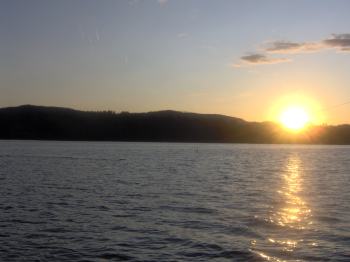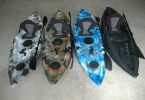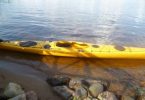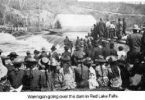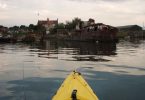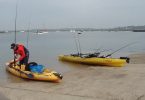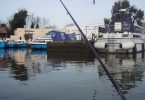Alright, I confess this is supposed to be about lake kayaking but maybe this is about something slightly more important. Many people talk about adventures when they thought they might perhaps die. I have never seriously entertained the notion that I might die other than in the comfort of my own bed. To be perfectly honest, though, there have been a few occasions when I wasn’t quite certain whether I would survive.
The first time was in 1993 when One World Trade Center in New York was bombed. The second occurred this summer in Sweden in a much more tranquil environment. I managed to flip a fishing kayak into 15 degree celsius water a kilometre offshore at 5:00 am on an otherwise immaculate morning. Worse still, I hadn’t told anyone I was going out fishing for pike beforehand.
The Early Morning Fishing Mission
After a great fishing trip a couple days before, I could not get the idea of catching big pike out of my mind. We rented a few kayaks, one of which we were assured was relatively stable and undoubtedly appropriate for fishing. That day, I tried to keep a normal conversation going with my family and friends but in my heart couldn’t wait for the sun to rise the next day. The idea is simply that you hook a big pike, hold your balance using your abdominal muscles as best you can and then let the fish drag you around the lake for a bit until it gets tired.
Sunrises in the Northern Latitudes
The main problem with being in the northern latitudes is that you want to get up at 3:00 am as the sun rises if your brain is light sensitive (which mine is). I decided to try to wait until 4:30 am to put the fishing kayak in the lake. There is a difference between a fishing kayak and a normal kayak. Specifically, a normal kayak can tip over at the drop of a hat. A fishing kayak has two or more holes behind the seat so that you can insert your fishing rods. It is also a bit wider by design and thus is supposedly more stable. You then should be able to pursue a good-sized fish without a great deal of trepidation regarding tipping over. As we say in American English – “yeah right”.
As I waited for the sun to reach the top of the valley in Sweden, I imagined what it would be like to have a big pike drag me around the lake until I ultimately horsed it into the kayak. I was not exactly sure how I would take the fish in or indeed whereabouts in the kayak I would stow it if I did succeed in landing it. In any event, details apart, the urge to try was irresistible. Then again, how things can go so horribly wrong.
 The Flip
The FlipAs I paddled out into the great wide open it suddenly struck me that the only thing a big pike or walleye would need to do would be to drag my fishing kayak sideways for a short period of time and I would be rolled under into the cold Swedish lake. I have always known the power of these strong fish and this morning I didn’t have the assurance of a nice 140 horse power motor behind me as I did a few days before. Now it was just me, a relatively unstable kayak and a paddle that only marginally resembled the canoe paddles I grew up with using.
In addition to the sudden realisation of how vulnerable I was in the kayak, two of my favourite phobias were starting to get the better of me – my lack of balance and my inherent fear of drowning. The recognition that I might have gone beyond my comfort zone lead me to exaggerate my next left stroke. I should never have pulled a left stroke with a couple of 6 inch lures dragging behind me on the same side of the kayak and over-leaning to the left side. Then again, everyone knows that hindsight is 20/20 vision. I didn’t have time to even consider recovering my balance before the kayak had capsized and I was suddenly experiencing the thermal shock of the cold lake water.
The World Trade Center Experience
Submerged in the water, my mind raced backwards with a heightened sense of clarity I don’t usually experience. I have been through a few other difficult situations before and I think I was trying to grab onto them for reassurance.
When the bomb went off under the World Trade Centers, my boss informed me with great authority that lightning had just struck the building. It seemed a bit unlikely to me given that, having grown up in Minnesota, lightning doesn’t usually strike in the middle of a February snowstorm. In any event, if you want to get on in corporate life, deference is an important personality trait. That was just before all communication went dead and the power shut off. We were then lead down a pitch black internal stairwell, filled with smoke and people in various states of panic.
 Fireman Assisting After the 1993 Bombing of the World Trade Center
Fireman Assisting After the 1993 Bombing of the World Trade Center
I eventually ended up stuck with one of my best friends in a room increasingly filling with smoke in the 44th floor sky-lobby. We were breathing through wet towels and chatting about the day’s sordid events. Fortunately, my friend’s Dad was a New York City fireman for many years. I listened very carefully to every suggestion his son made about how we were most likely going to survive a skyscraper fire until we were both out of the building safely. After about five hours or so, some very courageous fireman found a way to help us down.
Unfortunately, many years later, we all lost a few very good friends in the 9/11 attacks, including a fire fighter and hero named Charles Mendez who had spent his life dreaming of being a New York City fireman after too many years of office administration. He was a very good bloke and someone we all will respect from here to eternity.
Hypothermia Sets In
It took a few seconds before realising what had just happened. My first concern was my fishing equipment and the lures which were in fact borrowed from my professional fishing friend Anders. I knew that he would be unimpressed by my managing to lose them in such an incompetent fashion. After a quick and unimpressive dive I knew it was hopeless, perhaps unsurprisingly since I was wearing a lifejacket. My gear was already many metres under water and slowly and unstoppably sinking to the bottom of the lake at about 20 metres.
I have to confess that it does feel strangely warm and hospitable as your limbs start to go numb from hypothermia in very, very cold water. This is most likely because your brain is shutting down at the same time it has done everything it can to conserve your core body temperature. The only good thing about being so far out on a cold lake with a kayak is that it helps your mind start to focus on something. You need to bring in yourself and preferably the kayak. This gives you a simple task to complete and, as things get a bit tight, there are really only simple tasks left.
 This guy did way better than me
This guy did way better than me
The Importance of Lifejackets
Lifejackets are very important. My mother drummed into all of us the importance of wearing them whenever we were anywhere near water and she accepted no excuses. Of course, growing older I sometimes found reasons to excuse myself from wearing one. In normal circumstances I can swim across the lake and back without difficulty.
Similarly, ski helmets are no doubt important. I have drummed into my daughters the importance of wearing them and I accept no excuses. Of course I don’t always feel the necessity of wearing one myself, at least until I had a stand up row with one of my daughters who refused to wear one on the irrefutable grounds that I wasn’t wearing one either. My fears for her safety overcame my hypocrisy and I had no option but to acquire one for myself and sport it for the rest of the holiday.
In any event, on the morning in question I put on a lifejacket. Truth be told, I normally wouldn’t have even used one if it hadn’t been for the ski-helmet fight the winter before. On this occasion it saved my life. Not to belabour the point but the Swedish police needed to use some high tech underwater equipment to find the corpse of an unfortunate adolescent who had tipped out of a canoe the year before just outside our property without a lifejacket.
The Long Cold Swim Ashore
Thanks to my lifejacket, I spent the rest of the morning trying not to die of hypothermia, rather than worrying about my buoyancy. The only reason I was so far out on the lake was simple. If you have a depth and fish monitor, you begin to learn the underwater landscape of a lake. On our lake, the underwater hot spot ends up being more or less precisely where the kayak flipped. Unfortunately this was probably a bit too far off shore for a novice in a fishing kayak.
Everyone has an intrinsic ability to know when things start to really matter in the grander scheme of things. After the rods went in, my short unsuccessful dive to retrieve them and enduring the frigid water for a few moments, I knew that things were starting to really matter. I decided it was high time to start the long swim homeward with my lake kayak in tow.
After a half hour, my limbs were growing more sluggish with each stroke. In the end, I had to decide whether to let the kayak go or to continue to try to get it into shore with me. For any young anglers reading this, as a general rule, please remember not to leave your boat if it capsizes unless it loses its buoyancy (i.e. ability to float).
As mentioned before, not for one moment did I believe I was going to die, no more so than during the World Trade Center bombing in 1993. A few hundred yards from shore and having been in the water for a good bit, however, I did start to wonder whether I would survive. That can be a defining moment in one’s life. In that moment of relative uncertainly you start to ponder about things that really matter in your life – such as your family, chocolate, fireplaces, comfortable beds and such.
In the end, I took a few deep breaths, relaxed as much as possible and tried not to get too uptight about the whole situation. I can’t have done too bad a job given I am alive and still able to write this article.
The thing I really did get wrong that morning (well, other than flipping my kayak, losing my best rods, losing my friend’s expensive lures and ultimately almost drowning myself) was to be stupid enough to try to cuddle up to my wife once I made it up the hill from the lake. Given my frigid core body temperature, at that time I could almost have made ice-cubes of anyone touching me. There was also the slight problem that I forgot to even tell my wife I was going fishing that morning. One of the many things to love about my wife is that she just started laughing (rather than being angry) when she felt my shivering body come under the blanket. After about an hour it started to subside.
To put things in perspective, below is a poem written after the events of 9/11 in the United States. Both my wife and I lost a few people that day, including the fireman Charles Mendez, as those two gorgeous towers fell. Countless wonderful families were also destroyed that day. Thank you to all those courageous firemen who tried to save as many people as they could before losing their own lives. In the bombing of 1993, I will never forget witnessing their selfless efforts trying to get us out safely. In the end, I have nothing but respect for these wonderful, courageous men whose everyday bravery fills me with nothing but humility. Well, it puts fishing and flipping a kayak in a bit of perspective.
TWO FALLEN ANGELS
Steel towers gleamed
Looking skyward,
I still recall
The Sun refracting
Surreal imaged
Amid gorgeous twin faces.
Inside, looking down,
Morning’s golden-redden light;
Sun on New York harbour,
Then storm clouds marching
Ferociously across the sky,
Incandescent shadows below me.
Tall ships flew before,
Their sails fluttering unfurled;
The Hudson wide-mouthed
Welcomed them through
A distant joyful sky;
The special view revealed
Only from Angels on high
Two angry moments
Shattered our sanguinity;
Befell our lasting dreams
Crashing thunderously to Earth –
Erasing our memories
As if angels falling.
An empty space
Feels the absurdity;
Precious non-existence,
Wasted energy,
Goodwill destroyed
And souls lost forever.
© Scott Cameron; lake photograph by Henrik Lundell; editorial assistance from Margaret Boswell and Karin Glennert

